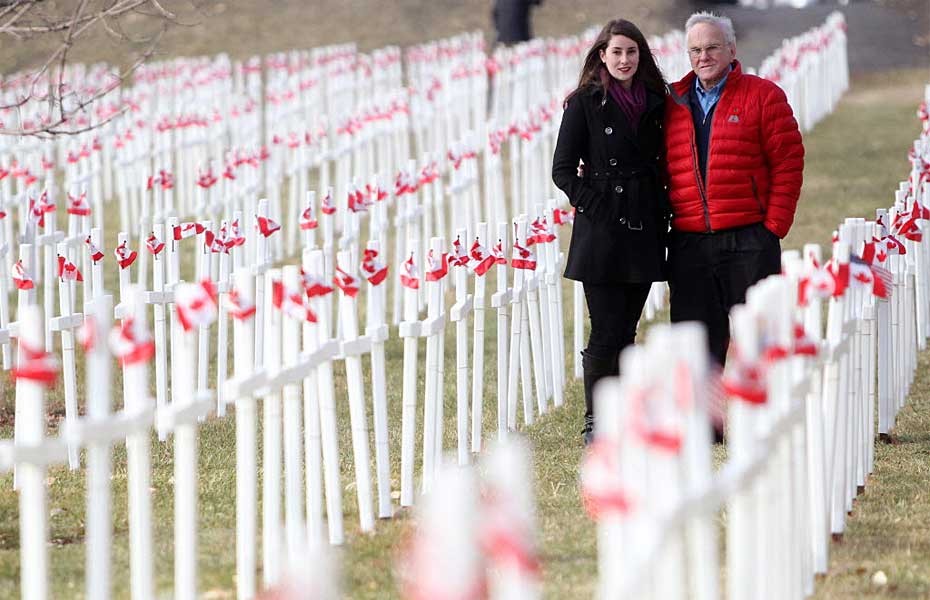For as long as he can remember, Murray McCann has faithfully worn his red poppy pin throughout much of November. It wasn’t until a 2008 trip to the southern United States, though, that he realized he could be doing a lot more.
Driving through Menlo, Ga., a town of less than 1,000 souls, he spotted a row of crosses, stretching across the horizon, which had just been erected along the highway in preparation for Memorial Day. The sight was so jarring, he pulled over to the side of the road to let it sink in.
“I realized, like I had never realized before, the number of lives lost so that I could enjoy the freedoms and lifestyle I enjoy,” says the Calgary businessman and philanthropist. “Those crosses graphically brought home to me, just how great a price was paid.”
By the following year, he’d paired up with friend George Bittman, a navy veteran who was president of the Calgary Poppy fund. Funding the project through his McCann Family Foundation, the Calgary Field of Crosses Memorial Project is now in its sixth year of life.
At sunrise each day starting Nov. 1 up to and including Remembrance Day on Nov. 11, a flag is raised at a ceremony attended by various school groups, community members, soldiers, their families and local dignitaries. Each sunset, another ceremony marks the lowering of the flag. The 3,200 white crosses along Memorial Drive (between 3 Street N.W. and Centre Street) are inscribed with the name, age, rank and regiment of soldiers who died in the two World Wars, the Korean conflict, Afghanistan and various peacekeeping missions.
Among the fallen honoured will be Calgary Herald journalist Michelle Lang, killed in December 2009 while reporting on the Canadian troops in Afghanistan. The tribute to Lang will be held at sunrise on Nov. 4. For McCann, who has kept his promise to continue on with the project after the death of Bittman in a 2011 boating accident, the Calgary Field of Crosses – the only one of its kind in the country – has taken on even greater resonance.
“I think Canadians have become far more aware and appreciative of our soldiers in the wake of the two tragic deaths last week,” he says, referring to the killings of warrant o cer Patrice Vincent and Cpl. Nathan Cirillo on Canadian soil. “We have all come together to condemn such brutal terrorism and to recognize what heroes our soldiers are.”
Indeed, by the time Nov. 11 is once more upon us, Canadians will already be well practised in the rituals of honouring our men and women in uniform. After the killings of the two soldiers, cenotaphs and war memorials in cities across the country have been the sites of impromptu vigils and shrines filled with flowers, notes and other tokens of respect.
That comes as no surprise, especially in light of the fact that the shooting of Cirillo took place at the National War Memorial, the national home of annual Remembrance Day ceremonies and a 75-year-old monument that not only commemorates our war dead, but also serves as a symbol of the sacrifices made by some in order that Canada be recognized as a country in its own right.
Add to that the fact that 2014 also marks the 100th anniversary of the start of the First World War and the 70th anniversary of DDay, and you have what Thomas Leppard calls a blockbuster year for Remembrance Day ceremonies and other events honouring our soldiers.
“On our Facebook site, we had a photograph of Cpl. Nathan Cirillo, which got 36,000 hits in one day,” says Leppard, a military historian and the president of Valour Canada, a Calgary-based national organization dedicated to connecting today’s Canadians with their military heritage. “His death at the base of the tomb of the unknown soldier really hit people in the heart.”
Like other local organizations, Valour Canada is holding its own events in November, the highlight being a Flame of Remembrance ceremony in which the Calgary Tower will light up the night sky on the eve of Nov. 11. While the event will honour First World War soldiers and Canadians at D-Day in the Second World War, Leppard says they’ll also be thinking of active soldiers.
“The fact we’ve become involved in the Middle East again,” he says, “just creates an even greater sense of awareness.”
Throughout the province, events such as the Remembrance Day ceremonies at city cemeteries held by the No Stone Left Alone Foundation on Nov. 6 (nostoneleftalone. ca) and the row of 116 flags along Highway 11 west of Red Deer will serve as reminders that this is indeed a monumental November for Canadians. The most obvious and enduring, though, is the poppy worn by people to both honour veterans and to help raise funds for them.
People like Joey Bleviss have been well prepared for a banner poppy-wearing year.
“We started noticing a big increase in request for poppies in the spring,” says Bleviss, chief administrative o cer of the Calgary Poppy Fund, which last year raised $2 million in donations by giving out the pins throughout the city.
“Two weeks ago, we saw another jump. People are feeling a lot more patriotic these days,” he says as he prepares for Saturday’s launch of the annual Calgary Poppy Campaign, which will distribute about 800,000 pins to individuals, schools and other local organizations.
While Canadians may wear the poppy as a symbolic gesture, the funds help support some very real post-military needs and issues, says Bleviss.
The Veterans Food Bank, currently in its annual food drive campaign (donations can be dropped o at Crown Surplus, 1005 11 St. S.E.), averages about 80 hampers a month to local veterans and their families; it also works with veterans su ering from PTSD as well as assisting with vocational and other counselling.
It’s not enough, says Dave Howard, to merely give thanks in November to those who fought for our freedoms.
“More Canadians are paying attention to our military, that these people put their lives on the line for the rest of us,” says Howard, director of the Canadian Legacy Project (canadianlegacy.org), which helps oversee the Calgary Field of Crosses as well as other initiatives. “Unfortunately, it’s the one, two weeks around Remembrance Day when we pay attention.”
Howard says true recognition will come when the federal government puts more resources into helping soldiers and their families dealing with such issues as PTSD, post-military career training and other needs.
“It’s not enough to just wear a poppy.”
A combination of tangible assistance with symbolic reverence is the vision shared with fellow supporters like Murray McCann, who has promised support of the Calgary Field of Crosses, in perpetuity, through the McCann Foundation.
“I never cease to get emotional when I hear the bugler playing Reveille,” says McCann, who will be at every service this November, sunrise and sunset, at the Memorial Drive site. “There is no higher calling in Canada, than to wear the uniform of Canada.”

